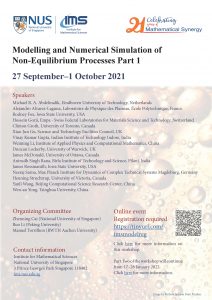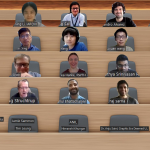Organizing Committee
Co-chairs
- Zhenning Cai (National University of Singapore)
- Ruo Li (Peking University)
- Manuel Torrilhon (RWTH Aachen University)
Contact Information
General Enquiries: ims(AT)nus.edu.sg
Scientific Aspects Enquiries: matcz(AT)nus.edu.sg
Overview
Many classical physical models rely on an assumption of local thermodynamic equilibrium, such as the continuum hypothesis of the Euler and Navier-Stokes equations of fluid mechanics. However, for systems composed of many particles, lack of particle interactions can often render this assumption unjustifiable. More refined models, such as kinetic models and molecular dynamics, retain validity in such situations. However, the high-dimensionality of these models may bring significant difficulties in the numerical simulation. Researchers are actively developing more computable models and more efficient numerical algorithms to describe nonequilibrium processes, which cover a number of fields including fluid mechanics, radiative transfer, plasma physics, etc.
The purpose of this program is to bring together leading scientists involved in the theory and applications of nonequilibrium processes to share recent progress on this topic. We expect the activities will stimulate discussions and promote collaborations between researchers.
Activities
| Date | Abstract | |
|---|---|---|
| Workshop on Modelling and Numerical Simulation of Non-Equilibrium Processes Part One | 27 September–1 October 2021 | View |
Venue
Online
Part Two of the workshop will continue from 17–28 January 2022. Click here for more information.
List of Speakers
- Michael R. A. Abdelmalik, Eindhoven University of Technology, Netherlands
- Alejandro Alvarez-Laguna, Laboratoire de Physique des Plasmas, École Polytechnique, France
- Rodney Fox, Iowa State University, USA
- Hossein Gorji, Empa - Swiss Federal Laboratories for Materials Science and Technology, Switzerland
- Clinton Groth, University of Toronto, Canada
- Xiao-Jun Gu, Science and Technology Facilities Council, UK
- Vinay Kumar Gupta, Indian Institute of Technology Indore, India
- Weiming Li, Institute of Applied Physics and Computational Mathematics, China
- Duncan Lockerby, University of Warwick, UK
- James McDonald, University of Ottawa, Canada
- Anirudh Singh Rana, Birla Institute of Technology and Science, Pilani, India
- James Rossmanith, Iowa State University, USA
- Neeraj Sarna, Max Planck Institute for Dynamics of Complex Technical Systems Magdeburg, Germany
- Henning Struchtrup, University of Victoria, Canada
- Yanli Wang, Beijing Computational Science Research Center, China
- Wen-an Yong, Tsinghua University, China


